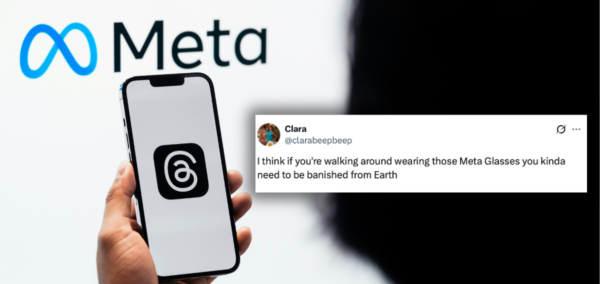
Over 40 per cent of universities are investigating students for using ChatGPT to cheat
Hundreds have been investigated for using AI chatbots in their assessments
For the past six months, one university student has managed to enter almost every lecture theatre and seminar classroom up and down the country.
They’re well spoken, always turn up on time, and make researched – if slightly mundane – arguments in their essays. However this isn’t a fresh-faced 18-year-old from a semi-detached four-bed in Surrey, this student is ChatGPT.
Figures obtained by The Tab reveal more than 40 per cent of UK universities have investigated students for using AI bots like ChatGPT to cheat in their assessments.
Replies to freedom of information requests from 114 universities show 48 institutions have investigated at least one student since December 2022.
In total, almost 400 students (at least 377*) have faced investigations for using AI chatbots in a university-assessed piece of work and at least 146* have so far been found guilty, with dozens of investigations still ongoing.
The figure was highest at the University of Kent where 47 students have been investigated for using ChatGPT or a similar AI chatbot.
A university spokesperson praised the “AI guidance and training” given to staff which they say allowed the university to “identify early misuse of the technology”.
They added students have been given training webinars and guidelines on how to use AI, “including a reminder that presenting AI-generated text or images as their own work constitutes a form of plagiarism”. In spite of this, 22 students have so far been found guilty of using AI chatbots in their assessments.
The Tab’s data also suggests AI investigations are taking a long time to reach an outcome. At Birkbeck, University of London, 41 students have been investigated but so far “the number who have admitted the offence is less than five”. The university admitted: “As this is new technology most of these investigations are still open.”
Third highest, Leeds Beckett, told The Tab it was doing its best to deal “with the rapidly developing situation regarding generative AI tools”. Of the 35 investigations that have so far been opened, more than half (19) haven’t reached an outcome and are still ongoing.
The full number of university students who have used ChatGPT to cheat in their assessments is likely to be even higher with numerous universities telling The Tab it didn’t hold the data centrally and to extract this information from every university department would be too costly.
One university feared by admitting its own figures, it could potentially damage its reputation. Anglia Ruskin argued other universities submitting “low inaccurate rates as a result of their investigation” risked the university “suffering unwarranted reputational harm” and it had a right to compete “fairly, in an open market”.
It appears cheating is taking place right across the spectrum. There were 22 investigations at the University of Bedfordshire, the UK’s lowest ranked university (according to The Times and Sunday Times Good University Guide 2023). Equally there were nine investigations, of which three have already been upheld – at the second best university in the country, St Andrew’s.
Nationally, dozens of students have received a mark of zero when they’ve been caught out by their university with some even failing their entire unit and others being referred to undertake academic practice training sessions and workshops. No student has yet been expelled for using ChatGPT.
Among 23 of the 24 Russell Group universities**, a quarter have investigated students for suspected use of AI chatbots including LSE, UCL and the University of Glasgow.
The University of York tops the list among Russell Group unis having investigated 20 of its students and found five students guilty.
The figures come as no surprise to Dr Richard Harvey, a professor of computer science at the University of East Anglia (UEA), who says ChatGPT at present is “almost configured for cheating”.
The lecturer, who has removed an essay from a unit he is teaching next year over fears students could use the chatbot, says he is well able to spot when one of his students uses ChatGPT.
“What I see is almost perfect grammar, and a stylistic construction that looks precisely like a 15-year-old school-kid.” Not holding back any punches, he adds: “It has a very deeply boring but beautifully done argumentation structure.”
Dr Andres Guadamuz, a reader in intellectual property law at the University of Sussex, is also well-versed in spotting ChatGPT.

The University of York has recorded 20 investigations – the most among the Russell Group institutions
He explained he marked three essays in January which were “clearly almost just copy and paste” from ChatGPT however this was when he suspects “students maybe thought we wouldn’t know about it”.
“The voice is very clear to me,” he says. “I don’t know how to explain it other than it is very boring. Whenever you are reading essays, people can’t help but put a little bit of themselves in that essay” but with ChatGPT “it has a very clear structure”. “It’s well written, don’t get me wrong, but it’s lacking something.”
Professor Fabio Arico leads the Centre for Higher Education Research Practice Policy and Scholarship at UEA and provides guidance to the university on how it should respond to the rise of ChatGPT.
Balancing his time as an economics lecturer, he’s also spotted how his students have used ChatGPT. It answers in “spirals” he explains. “ChatGPT has this way of waffling when it responds to an answer, it just sort of hovers in circles.”
He’s fairly scathing of the bot’s essay writing ability. “Some of the stuff I’ve seen barely scrapes a 40 in my book.”
His colleague, Professor Harvey, agrees. “Could ChatGPT be used for filler text and I wouldn’t notice?” he asks. “Yes, easily. But does that filler text generate any marks? Not if I’ve got the mark scheme right.”
Although The Tab found investigations were taking place at more than 40 per cent of the 114 universities it surveyed, there were less than 10 cases on average per university. So why then is the number so low?
Dr Guadamuz suggests one answer. There is a huge lack of trust in the current AI detection software available.
Three months ago, Turnitin, the industry leading plagiarism detection software used by almost every university in Britain, launched its new tool which claimed it could show how much of an essay was produced by a chatbot like ChatGPT.
However, whilst every university continues to subscribe to Turnitin’s normal plagiarism detection software, the new AI detection tool has faced doubts from the start with universities increasingly choosing not to use the software.
The problem was Turnitin, despite producing a very hubristic press release announcing it had “flipped the switch” on AI detection, could only promise the tool can identify AI-generated text with 98 per cent confidence.
98 per cent might sound like a good figure but what it really means is there is an underlying false positive rate, i.e. there is a risk of falsely accusing a student of using ChatGPT when they haven’t.
In May, The Tab exposed how this happened at the University of Bolton when a freedom of information request sent to the university showed a student’s work had been “wrongly flagged” by Turnitin’s software when the piece was all the student’s original work.
The student was therefore cleared of any wrongdoing and the investigation ended, however the risk of falsely accusing one of their own students has left lecturers with a feeling of deep unease.
“I can’t afford for it to be wrong as a marker, I don’t feel confident in accusing someone or giving someone a mark which potentially can influence someone’s life,” Dr Guadamuz says.
Professor Arico adds: “If you actually catch a student and you claim the student has plagiarised and you use these detection tools in quite a ruthless way without actually thinking – you could end up applying penalties, up to an expulsion from an institution for something that hasn’t actually happened.
“That’s quite serious, I mean you are ruining people’s lives.”
Professor Harvey believes: “When you are doing plagiarism cases, you’ve always got to balance the cost of a false accusation against the catching of everyone.
“Once you start thinking about it deeply you realise you are going to have to let some people get away with it in order to not destroy a number of people who are innocent just as the legal system does.
“The test of guilt is probably stronger than you might feel and that’s the way it is.”

UEA lecturer Professor Harvey reasons some students will be getting away with using ChatGPT
Annie Chechitelli, Chief Product Officer at Turnitin defended the company’s AI detection tool. “Only the educator can determine whether the use of AI writing tools is appropriate and allowed under the particular assessment, and if the writing is different enough from the student’s body of work to merit further investigation,” she told The Tab.
“Our AI detection feature points to areas within academic writing that may bear further attention from the educator and perhaps conversation with the student about what, if any generative AI tools were used.
“As the technology evolves, we continue to evolve with it – through enhancements to our detection capability as well as our guidance and resources on generative AI and AI writing detection.”
Evolving is something Professor Arico is keen to push. “Overall the mood is a bit better than six months ago. January is when I first started delivering training sessions for my colleagues and it was panic mode, firefighting, people asking ‘what are we going to do now?’
“Concerns are becoming more mature than before,” he says – before admitting staff are still very much in two different camps.
“I have colleagues that come to one of my training sessions and are saying ‘oh my god, I didn’t realise that this was happening’ and you’ve got the other ones who are saying ‘this is so exciting’.”
“I understand people being scared and people being afraid of change but hey this is our job, we need to train students for the world out there and we can’t just do things how we’ve been doing them for the past 30 years, it’s just not acceptable it’s as simple as that.”
* In some instances, universities would not disclose the precise figure as it was less than five. Here we have assumed the figure is one to avoid the risk of overestimating the total.
**The University of Birmingham was the only Russell Group university which did not respond to our freedom of information request.
Related stories recommended by this writer:
• First known student caught using ChatGPT at UK university – here’s how they were exposed
• There were more than 1 million visits to ChatGPT website at universities in last exam season
• Zero Cambridge students investigated for ChatGPT cheating despite half admitting using it


















